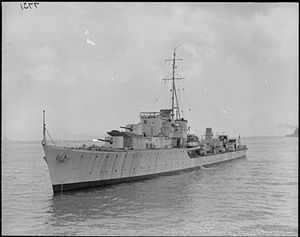HMS Oribi (G66)
 | |
| Career (UK) | |
|---|---|
| Name: | HMS Oribi |
| Ordered: | 3 September 1939 |
| Builder: | Fairfield Shipbuilding and Engineering Company, Govan, Scotland |
| Laid down: | 15 January 1940 |
| Launched: | 14 January 1941 |
| Commissioned: | 5 July 1941 |
| Decommissioned: | 1 January 1946 |
| Fate: | Sold to Turkey[1] |
| Career (Turkey) | |
| Name: | Gayret |
| Acquired: | 1946 |
| Fate: | Scrapped 1965 |
| General characteristics | |
| Class and type: | O-class destroyer |
| Displacement: | 1,540 long tons (1,560 t) |
| Length: | 345 ft (105 m) o/a |
| Beam: | 35 ft (11 m) |
| Draught: | 13 ft 6 in (4.11 m) |
| Propulsion: | 2 × Pearson geared steam turbines, 40,000 shp (29,828 kW) 2 Admiralty 3-drum boilers 2 shafts |
| Speed: | 37 knots (43 mph; 69 km/h) |
| Range: | 3,850 nmi (7,130 km) at 20 kn (23 mph; 37 km/h) |
| Complement: | 175 |
| Armament: | • 4 × single 4.7-inch guns • 1 × quad QF 2-pdr "pom-pom" • 6 × single 20 mm Oerlikon guns • 2 × quad 21 inches (533 mm) torpedo tubes |
HMS Oribi (G66) was an O-class destroyer of the Royal Navy. Following the style of her sister ships she was named with a word beginning with O. Originally she was to have been christened HMS Observer, but for unknown reasons she was christened HMS Oribi, after the oribi, a South African antelope.
Second World War service
Oribi was one of the destroyers that supported the March 1941 Lofoten Island Commando raid ("Operation Claymore"), by shelling the islands and attacking German shipping in the sheltered anchorage. She also assisted to bring Norwegian nationals home after the raid to escape the German occupation.
She saw extensive action during the Arctic and North Atlantic convoys of the Second World War. These included Convoy ONS 5 in May 1943, regarded as the turning point of the Battle of the Atlantic.
Postwar service
Oribi was transferred to the Turkish Navy in 1946 and renamed Gayret, to replace a previous ship of that name requisitioned by the Royal Navy during the Second World War and lost during hostilities. She received the new pennant number D15 and was used as a headquarters ship.[2]
Notes
- ↑ Ex-British O class destroyers at battleships-cruisers.co.uk
- ↑ Blackman, Raymond V B, Jane's Fighting Ships 1963-4, Sampson Low, Marston & Co. Ltd, London, p249
References
- Colledge, J. J.; Warlow, Ben (2006) [1969]. Ships of the Royal Navy: The Complete Record of all Fighting Ships of the Royal Navy (Rev. ed.). London: Chatham Publishing. ISBN 978-1-86176-281-8. OCLC 67375475.
- Raven, Alan; Roberts, John (1978). War Built Destroyers O to Z Classes. London: Bivouac Books. ISBN 0-85680-010-4.
- Whitley, M. J. (1988). Destroyers of World War 2. Annapolis, Maryland: Naval Institute Press. ISBN 0-87021-326-1.
- Ian Kinloch Bryce ( 2005 )author = Shipmates and Mistresses.bye and large. publisher = The Memoir Club ISBN 1-84104-043-6
| ||||||||||||||||||||||||||||